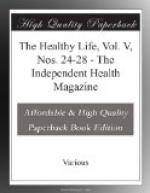cross-roads of our dream-way, some precautions to
be observed if we would not let romance obscure and
hinder us in our search after reality. But none
of these “castles” are bad in themselves.
In so far as they quicken our attention power, deepen
our thoughtfulness, make our activities more elastic
and keep us from carelessness or sloth, they are
surely all to the good as episodes in our development.
E.M. COBHAM.
THE SCIENTIFIC BASIS OF VEGETALISM.
This article, the earlier part of which appeared in the October number, is from the French of Prof. H. Labbe, the head of the laboratoire a la Faculte de Medecine, in Paris. It reflects a characteristic aloofness to a any considerations other than scientific or economic. But it will well repay careful study.—[EDS.]
V
Though the consumption of vegetable foods seems to offer a slight disadvantage from the point of view of albuminoid matters, this is not the case touching hydro-carbonated matters and sugars. The vegetable kingdom constitutes the almost exclusive source of these alimentary principles. One cannot indeed take much account of the consumption of the .5-.6 per cent, of glycogen which exists in the animal muscle partaken of under the shape of butcher’s meat. There is hardly enough in this for a large eater of between 200 and 250 grammes of meat, to find in hydrocarbonated matters the 1/300 or the 1/400 of the daily ration. Hydrocarbons are necessarily borrowed from the vegetable foods. This is also the case with sugars which do not exist in the animal kingdom in appreciable quantities. It is the same thing with alcohol which is obtained only from the vegetable kingdom.
VI
As to fatty matters, animal foods, like vegetable products, are abundantly provided with them. Moreover, from the point of view of digestibility and capability of assimilating, one may say that there is a quasi-absolute identity between animal and vegetable fats. The reason which would induce us to prefer either would not seem to be of a physiological nature. The economics, which we shall see further on, take this upon themselves, as the most serious reproach which can be made against the use of animal dishes is doubtless their dearness, and the reason which militates most in favour of the predominance of a vegetable diet is to a certainty its cheapness.
VII
Such are, briefly expounded and refuted, the fundamental objections which can be brought against the vegetarian diet and the “vegetalian” customs. There exists, in fact, no serious physiological or chemical reason for not satisfying our needs solely with foods of vegetable origin. It may be interesting to note that, in reality, the most confirmed flesh eaters support their energy-producing needs mainly with vegetable products. In the mixed diet universally practised meat plays but a small part.




